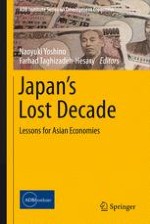2017 | OriginalPaper | Buchkapitel
8. The Ineffectiveness of Japan’s Negative Interest Rate Policy
verfasst von : Naoyuki Yoshino, Farhad Taghizadeh-Hesary, Hiroaki Miyamoto
Erschienen in: Japan’s Lost Decade
Verlag: Springer Singapore
Aktivieren Sie unsere intelligente Suche, um passende Fachinhalte oder Patente zu finden.
Wählen Sie Textabschnitte aus um mit Künstlicher Intelligenz passenden Patente zu finden. powered by
Markieren Sie Textabschnitte, um KI-gestützt weitere passende Inhalte zu finden. powered by
